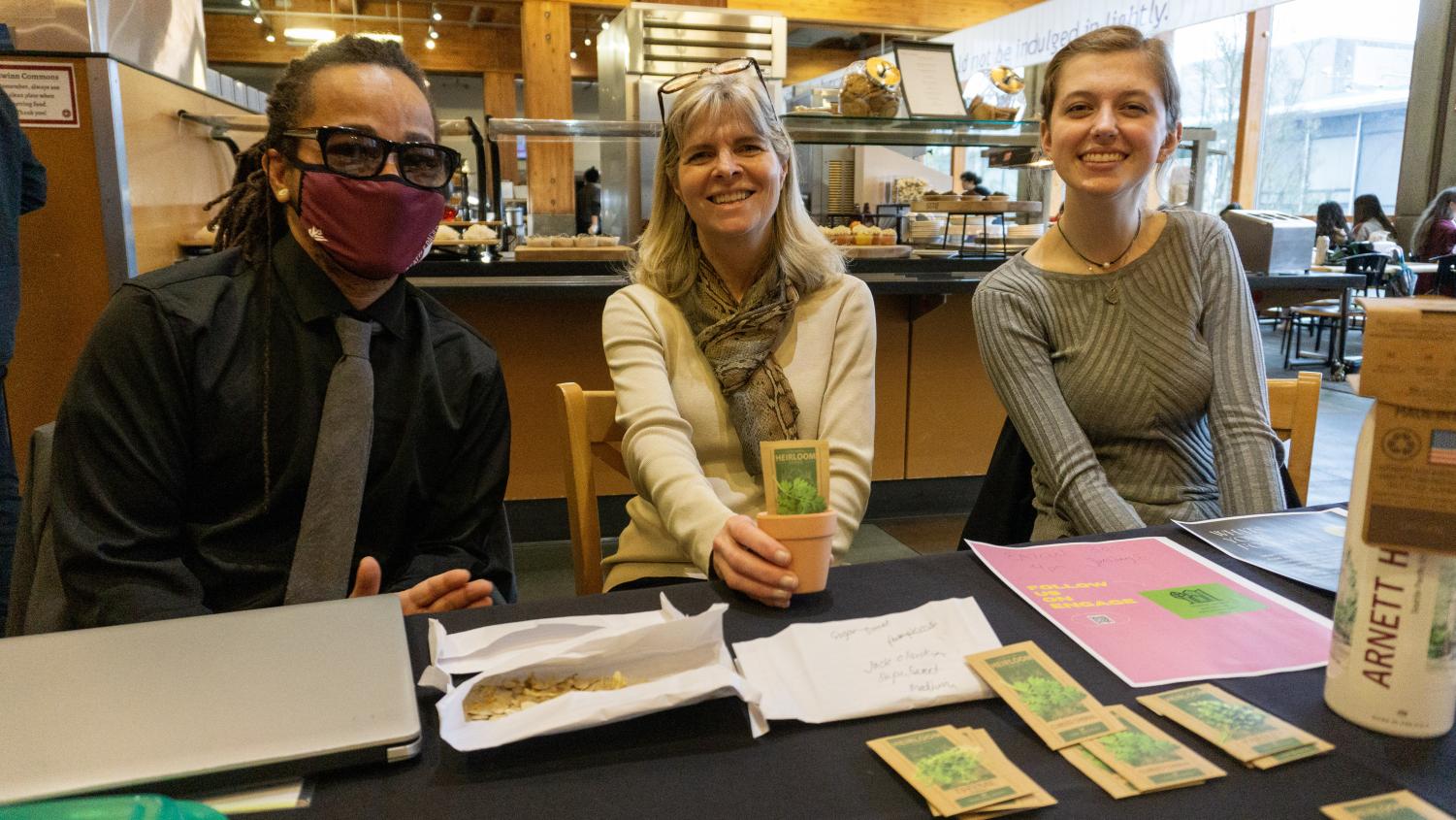What SPU is doing for the environment, how you can help
Gwinn Commons aims to create eco-friendly dining
April 26, 2023

On April 20, Sodexo and Seattle Pacific University’s sustainability club worked together to create a vegetarian-forward dinner at Gwinn Commons, an event to celebrate Earth Month.
At this dinner event, Gwinn guests were able to choose from a variety of vegetarian and vegan menu options, ranging from ‘Impossible’ burgers to mushroom risotto; with only one meat option.
The sustainability club’s president, Eli Westbrooks, a third-year political science major, played a part in planning the environment sustainability event. Planning for this event began in winter quarter with the help of Gwinn Commons and Sodexo organizers.
“We have a station takeover. So we have a station that caters to just vegetarian and vegan [diets]. It is a meatless menu that has Beyond Meat, vegan options and gluten-free options. So we have a whole station that’s geared towards sustainability here at Gwinn,” Westbrooks said.
According to Westbrooks, the main goal of the event was to educate Gwinn guests about the impact their diet may have on the environment and how small changes to the way they eat can help towards a more sustainable lifestyle.
“We wanted to highlight the impacts of a meatless diet,” Westbrooks said. “For instance, one day a week without meat – if you do that every week for an entire year, it’s the equivalent of [saving] 365 miles of emission from a vehicle.”
Richard Rahardja is the marketing coordinator for the SPU dining team and works for Sodexo. As a member of the dining team, Rahardja enjoys supporting SPU clubs and helping them create events at Gwinn Commons. Previously, Sodexo has collaborated with clubs to host events centered on International Women’s Day and Lunar New Year, among others.
“At SPU dining, we have committed to at least two events with student organizations per quarter. It allows us to get in touch with the greater SPU community, and it also allows us to pursue events our community is passionate about,” Rahardja said. “We encourage student clubs to give their menu recommendations because the events celebrate what they’re passionate about.”
While the sustainability event was for a single night, Gwinn has been making an effort to create environmentally sustainable dining year-round. A more recent initiative is the Choose to Reuse program, aimed to reduce plastic waste for taking food to go. With the CTR program, guests can receive a plastic to-go box to take their meal home or a clip that may be used to redeem a box in the future.
“We’re really proud of that program because of how it helps Gwinn Commons reduce waste. Before the ‘Choose To Reuse’ program, we didn’t have a sustainable method of taking food home for students, so there would be lots of plastic waste,” Rahardja said. “The reusable to-go container program allows us to reduce waste at Gwinn, but it is also more convenient for students because it is reusable and microwavable as well.”
Another way Gwinn Commons is able to reduce waste is with LeanPath, a service that allows kitchens to measure how much food they are discarding. SPU Dining uses this service in hopes to reduce its waste.
“We’re able to build projections for every meal at Gwinn Commons. This allows us to not only reduce waste but helps our team be more flexible with the food we’re serving,” Rahardja explained. “What we find is that by educating everyone throughout the system, students included, we’ll be able to be more sustainable. Of course, our team will be able to understand portioning and how that may contribute to [food] waste.”
Additionally, SPU Dining is using a more sustainable method of sourcing its food. According to Seattle Pacific Dining Services, much of Gwinn Commons’ food comes from local businesses and farmers and partners with the Puget Sound Food Hub Coalition. Sustainable Connections says that by shopping locally, there is less transportation involved, leading to less pollution while supporting local businesses.
While staff and faculty work behind the scenes to help make SPU more sustainable, students can contribute to the cause by making new decisions in their own lives. Simple ways to become more eco-friendly can range from riding a bike instead of driving a car to reducing the amount of meat they eat. At SPU, students can learn more about the environment by engaging with the sustainability club, like first-year environmental justice major Madalynn Stark.
“I would say to stop by a meeting. They’re really fun and kind of casual, with no stress. Come see what it is,” Stark said. “Being an environmental justice major, it really inspired me to want to come and join a club that helps the environment and gets to talk about big ideas like climate change.”
Janette Plunkett, sustainability manager at SPU, makes it her goal to encourage people to help make a more environmentally sustainable community.
“Everything we do individually is wonderful and helpful. But to really tackle the problem we need to come together and have policies and organizations that help us move off of fossil fuels,” Plunkett said. “That’s something that I work with all the universities in the state of Washington to help promote. I would love to see students become more aware and involved.”
The sustainability club encourages students to reach out to them on Engage and to stop by their meetings on Tuesdays at 4 p.m. in Eaton 305. Plunkett believes that by students and faculty educating themselves on the issues our environment is facing, our community can do its part in solving those issues.
“SPU has had a dedication to sustainability for a long time. As a sustainability manager, I am working on helping us manage our energy usage and promoting sustainability across the curriculum, as well as with the [sustainability] club, providing opportunities for students to engage and advocate,” Plunkett said.


























































































